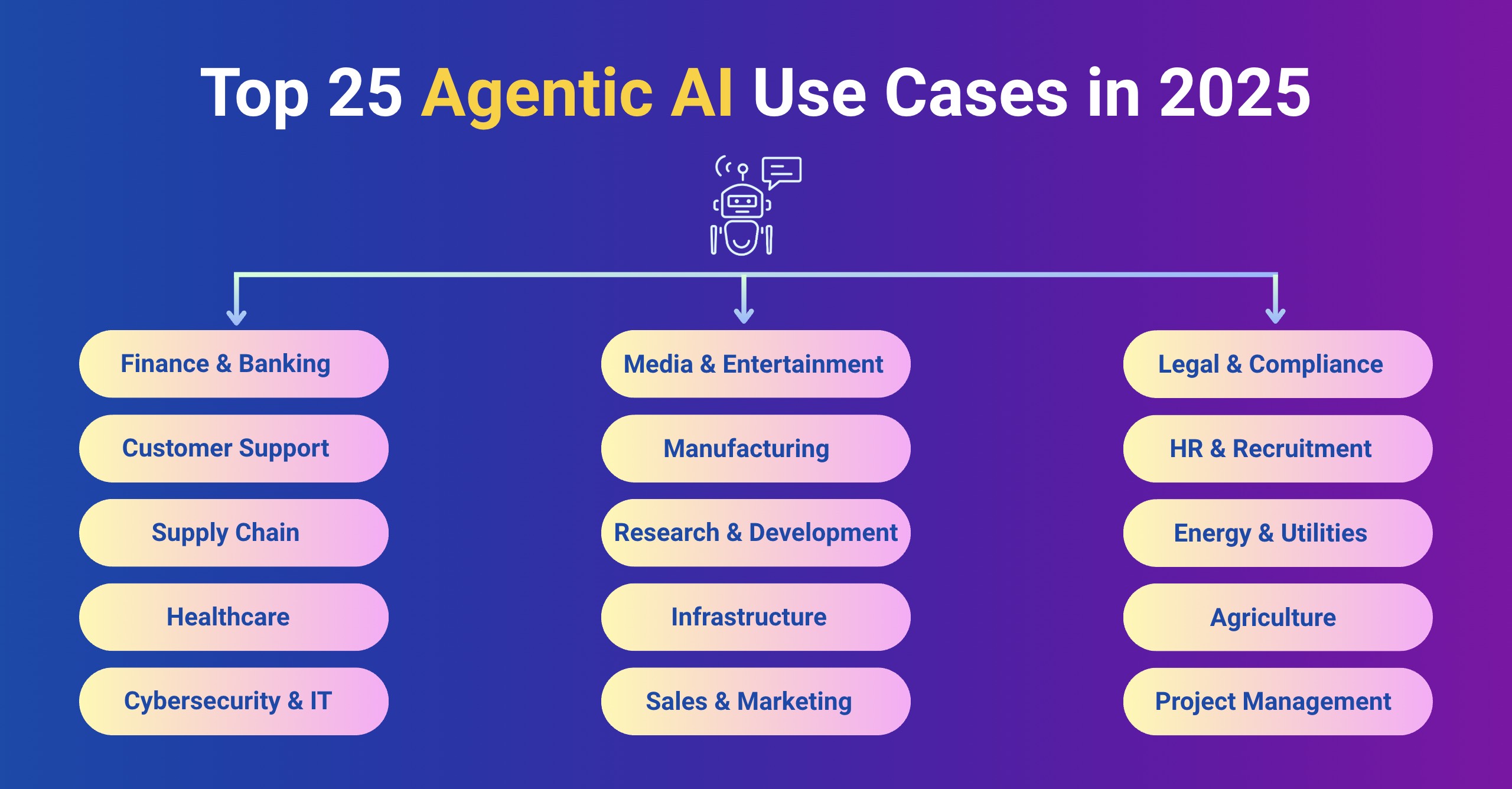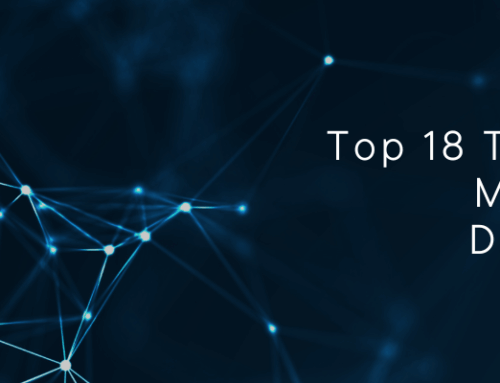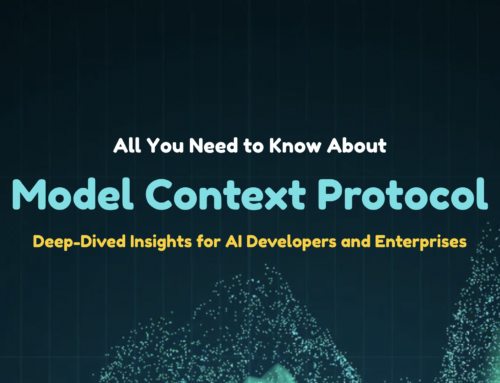Top 25 Agentic AIUse Cases in 2025
As we advance through 2025, the artificial intelligence landscape has evolved far beyond the generative AI boom of 2023-2024. The current focus has shifted to agentic AI, the kindof autonomous systems that don’tjust generate content or provide responses, but actively pursue goals, make decisions, and execute complex workflows without human intervention. According to recent industry reports, the agentic AImarket is projected to reach $78.2 billionby 2030, with enterprise adoption accelerating at an unprecedented 127% year-over-year growth rate in 2025.
About The 2025 Agentic AI Revolution
Several converging factors have accelerated agentic AI adoption in 2025:
- Advanced Model Capabilities: The latest foundation models demonstrate sophisticated reasoning abilities, with GPT-5 and Claude 4 family models showing significant improvements in multi-step planning and autonomous decision-making.
- Enterprise Infrastructure Maturity: Organizations have developed the data infrastructure, API ecosystems, and cloud architectures necessary to support complex agentic workflows.
- Regulatory Clarity: The EU AI Act implementation and similar frameworks in other regions have provided clear guidelines for autonomous AI deployment, accelerating enterprise adoption.
- Economic Pressures: Rising operational costs and talent shortages have created compelling business cases for autonomous systems that can operate 24/7 without human oversight.
- Competitive Necessity: Early adopters of agentic AI have gained such significant advantages that adoption has become a competitive imperative rather than an optional enhancement.
Understanding Agentic AI from the 2025 Enterprise Perspective
Agentic AI systems in 2025 possess four critical capabilities that distinguish them from previous generations of AI:
- Autonomy: They operate independently, making decisions and taking actions without continuous human intervention.
- Goal-Oriented Behavior: They work toward specific objectives, adapting their strategies as conditions change.
- Reasoning and Planning: They can break down complex problems into manageable steps and devise multi-stage solutions.
- Learning and Adaptation: They continuously improve their performance based on outcomes and feedback.
These characteristics enable agentic AI to function as autonomous business units rather than mere tools, capable of handling sophisticated business processes that previously required human expertise and judgment. In 2025, successful implementations demonstrate that these systems can achieve 90%+ accuracy in decision-making tasks while operating continuously without fatigue or bias.
The Top 25 Agentic AIUse Cases Making Impactsin 2025
1. Autonomous Financial Trading and Risk Management
Financial markets generate over $6 trillion in daily trading volume, creating opportunities that exist for microseconds. Agentic AI trading systems now execute complex multi-asset strategies, automatically adjusting positions based on real-time market sentiment, geopolitical events, and technical indicators.
Industry Impact: As of 2025, algorithmic trading accounts for 75% of all equity trades, with agentic systems handling increasingly complex scenarios including ESG compliance, cryptocurrency arbitrage, and cross-border regulatory requirements.
2025 Innovation: JPMorgan Chase’s latest COIN evolution processes over 50,000 commercial agreements annually, while new quantum-resistant security protocols ensure transaction integrity in the post-quantum computing era.
2. Intelligent Customer Service Orchestration
Modern customer service demands go far beyond scripted responses. Agentic AI customer service agents handle complex, multi-turn conversations while seamlessly coordinating with human agents, accessing customer history, processing refunds, scheduling services, and escalating issues intelligently.
2025 Breakthrough: Advanced customer service agents now handle 85% of interactions end-to-end, with multilingual capabilities, emotional intelligence, and predictive issue resolution.
Measurable Results: Leading companies report 55% reduction in resolution time and 78% improvement in first-call resolution rates, with customer satisfaction scores reaching all-time highs.
3. Dynamic Supply Chain Optimization
Supply chains involve thousands of variables, from weather patterns affecting shipping routes to geopolitical tensions impacting material availability. Agentic AI systems continuously monitor these factors, automatically adjusting procurement schedules, rerouting shipments, and negotiating with suppliers to maintain optimal inventory levels.
2025 Evolution: Walmart’s next-generation supply chain AI now processes over 500 million data points daily, integrating climate data, geopolitical risk assessments, and consumer sentiment analysis to predict demand with 94% accuracy while reducing waste by $4.2 billion annually.
4. Personalized Healthcare Treatment Planning
Healthcare AI agents analyze patient data, medical literature, and treatment outcomes to develop personalized treatment protocols. They monitor patient progress, adjust medication dosages, and alert healthcare providers to potential complications before they become critical.
2025 Clinical Advancement: Mayo Clinic’s AI agents have achieved 89% diagnostic accuracy across complex cases while reducing diagnostic time by 60%. New FDA-approved therapeutic AI agents now autonomously adjust treatment protocols for chronic conditions with physician oversight.
Regulatory Evolution: The FDA’s 2025 AI Medical Device Framework has accelerated approval of agentic healthcare systems, with 127 new AI medical devices approved in the first half of 2025 alone.
5. Intelligent Cybersecurity Defense
Cyber threats evolve constantly, with attackers using AI to develop more sophisticated attack vectors. Agentic cybersecurity systems fight fire with fire, autonomously detecting, analyzing, and neutralizing threats while learning from each incident to strengthen future defenses.
2025 Threat Landscape: Organizations now face an average of 25,000 security alerts daily. Modern agentic cybersecurity systems process 100% of these alerts, respond to genuine threats within milliseconds, and predict attack vectors with 96% accuracy.
Quantum-Ready Security: 2025 implementations include quantum-resistant encryption protocols and AI-powered deception networks that actively mislead sophisticated attackers while gathering intelligence on their methods.
6. Content Creation and Brand Management
Creative industries are experiencing an agentic AI revolution. These systems don’t just generate content—they develop comprehensive content strategies, manage brand voice consistency across platforms, optimize posting schedules, and engage with audiences in meaningful ways.
Creative Process: Netflix’s content recommendation AI agents analyze viewing patterns, social media sentiment, and cultural trends to guide both content acquisition and original programming decisions, contributing to a 90% viewer retention rate for recommended content.
7. Predictive Maintenance in Manufacturing
Manufacturing downtime costs the global economy $50 billion annually. Agentic maintenance systems monitor equipment performance, predict failures weeks in advance, and autonomously schedule repairs during optimal maintenance windows.
Operational Excellence: General Electric’s Predix platform deploys AI agents across industrial equipment, achieving 99.5% uptime rates and reducing maintenance costs by 30%.
Multi-System Integration: These agents coordinate across multiple manufacturing systems, ensuring that maintenance schedules don’t disrupt production flows or create bottlenecks.
8. Autonomous Research and Development
Scientific research and product development involve complex hypothesis testing, literature reviews, and experimental design. Agentic AI systems accelerate these processes by autonomously conducting literature reviews, designing experiments, and even generating new research hypotheses.
Scientific Breakthrough: DeepMind’s AlphaFold agent solved protein folding predictions that had puzzled scientists for decades, accelerating drug discovery timelines by an estimated 10-15 years.
Commercial Applications: Pharmaceutical companies using agentic R&D systems report 40% faster time-to-market for new compounds and 60% reduction in research costs.
9. Smart City Infrastructure Management
Urban environments generate massive amounts of data from traffic sensors, utility systems, and public services. Agentic AI systems orchestrate these complex networks, optimizing traffic flow, managing energy distribution, and coordinating emergency responses.
Urban Innovation: Singapore’s Smart Nation initiative deploys AI agents that reduce traffic congestion by 25% and improve emergency response times by 35%.
Sustainability Impact: These systems optimize energy consumption across entire city districts, achieving 20-30% reductions in carbon emissions.
10. Advanced Sales Process Automation
Sales processes involve complex relationship building, proposal customization, and negotiation strategies. Agentic sales AI goes beyond lead scoring to actively nurture prospects, customize presentations, and even conduct initial qualification calls.
Sales Performance: Companies using agentic sales systems report 45% increases in qualified leads and 30% improvements in conversion rates.
Relationship Intelligence: These systems analyze communication patterns, sentiment, and behavioral cues to recommend optimal engagement strategies for each prospect.
11.Intelligent Legal Document Processing
Legal work involves extensive document review, contract analysis, and regulatory compliance checking. Agentic legal AI systems autonomously review contracts, identify potential risks, suggest modifications, and ensure compliance across multiple jurisdictions.
Legal Efficiency: Large law firms report 70% reduction in document review time and 85% improvement in contract compliance accuracy.
Risk Mitigation: These systems identify contractual risks and regulatory issues that human reviewers miss approximately 20% of the time.
12. Dynamic Pricing and Revenue Optimization
Pricing strategies must adapt to market conditions, competitor actions, and demand fluctuations in real-time. Agentic pricing systems continuously analyze these factors and adjust prices to maximize revenue while maintaining competitive positions.
Market Dynamics: Airlines using dynamic pricing agents report 8-12% revenue increases by optimizing seat prices based on over 200 variables including weather, events, and booking patterns.
Competitive Intelligence: These systems monitor competitor pricing strategies and market positioning to inform pricing decisions automatically.
13. Autonomous Quality Control and Inspection
Manufacturing quality control requires consistent attention to detail and rapid decision-making. Agentic QC systems use advanced computer vision and sensor data to identify defects, classify severity levels, and determine appropriate corrective actions.
Quality Metrics: Automotive manufacturers implementing agentic quality control report 95% reduction in defect rates and 60% decrease in recall incidents.
Continuous Improvement: These systems identify patterns in defects and automatically adjust manufacturing parameters to prevent future quality issues.
14. Intelligent Recruitment and Talent Acquisition
Modern recruiting involves screening thousands of candidates, conducting initial assessments, and matching skills to role requirements. Agentic recruiting systems autonomously source candidates, conduct preliminary interviews, and even negotiate initial offer terms.
Talent Pipeline: Companies using agentic recruiting systems reduce time-to-hire by 50% while improving candidate quality scores by 35%.
Bias Reduction: These systems implement sophisticated bias detection algorithms, resulting in 40% more diverse candidate pools.
15. Smart Energy Grid Management
Energy grids must balance supply and demand across complex networks while integrating renewable sources with variable output. Agentic energy management systems optimize power distribution, predict demand fluctuations, and coordinate between different energy sources.
Grid Optimization: Utility companies report 15% improvement in grid efficiency and 25% better integration of renewable energy sources.
Predictive Capabilities: These systems predict energy demand with 94% accuracy up to 48 hours in advance, enabling optimal resource allocation.
16. Autonomous Investment Advisory Services
Wealth management requires personalized strategies, continuous portfolio monitoring, and tactical adjustments based on market conditions. Agentic advisory systems provide personalized investment recommendations while continuously rebalancing portfolios.
Wealth Management Revolution: Robo-advisors managing over $1.4 trillion in assets use agentic systems to deliver personalized advice previously available only to high-net-worth clients.
Performance Tracking: These systems consistently outperform traditional portfolio management by 2-3% annually through more frequent rebalancing and tax optimization.
17. Intelligent Transportation Logistics
Logistics optimization involves coordinating vehicles, routes, and delivery schedules across complex networks. Agentic logistics systems autonomously plan routes, adjust for traffic conditions, and coordinate with customer schedules.
Delivery Excellence: UPS’s ORION system uses agentic routing algorithms to save 100 million miles annually, reducing fuel costs by $300-400 million.
Last-Mile Innovation: These systems optimize final delivery segments, achieving 30% improvement in delivery efficiency and 90% on-time delivery rates.
18. Smart Building Operations Management
Modern buildings integrate HVAC, security, lighting, and access systems that must work together efficiently. Agentic building management systems optimize energy usage, enhance security, and improve occupant comfort automatically.
Operational Efficiency: Smart buildings using agentic management systems achieve 30% energy savings and 25% reduction in operational costs.
Occupant Experience: These systems learn occupant preferences and automatically adjust environmental conditions, improving satisfaction scores by 40%.
19. Autonomous Social Media Management
Social media management requires consistent posting, engagement monitoring, and brand reputation management across multiple platforms. Agentic social media systems create content calendars, respond to mentions, and manage crisis communications.
Brand Management: Companies using agentic social media management report 60% increase in engagement rates and 45% improvement in brand sentiment scores.
Crisis Response: These systems identify potential PR issues 75% faster than human monitors and implement response strategies within minutes.
20. Intelligent Market Research and Competitive Analysis
Market research involves gathering data from multiple sources, analyzing trends, and generating actionable insights. Agentic research systems continuously monitor market conditions, competitor activities, and consumer sentiment.
Strategic Intelligence: These systems process 100x more data sources than traditional research methods, identifying market opportunities 6-8 weeks earlier than competitors.
Trend Prediction: Agentic research systems achieve 80% accuracy in predicting market trends 3-6 months in advance.
21. Advanced Fraud Detection and Prevention
Financial fraud involves sophisticated schemes that evolve constantly. Agentic fraud detection systems analyze transaction patterns, behavioral anomalies, and network connections to identify and prevent fraudulent activities.
Fraud Prevention: Banks using agentic fraud detection report 85% reduction in false positives and 70% improvement in actual fraud detection rates.
Adaptive Learning: These systems learn from each fraud attempt, continuously improving their detection capabilities and staying ahead of evolving fraud techniques.
22. Intelligent Project Management and Resource Allocation
Complex projects involve multiple teams, dependencies, and resource constraints. Agentic project management systems optimize resource allocation, predict project risks, and automatically adjust schedules based on changing conditions.
Project Success: Organizations using agentic project management report 40% improvement in on-time delivery and 35% reduction in budget overruns.
Risk Mitigation: These systems identify project risks 3-4 weeks earlier than traditional methods, enabling proactive risk mitigation strategies.
23. Autonomous Employee Training and Development
Employee development requires personalized learning paths, skill assessment, and performance tracking. Agentic training systems create customized development programs, adapt to learning styles, and measure skill improvement.
Learning Outcomes: Companies using agentic training systems report 50% faster skill acquisition and 65% better knowledge retention rates.
Career Development: These systems identify career advancement opportunities and recommend specific skill development paths for each employee.
24. Smart Agriculture and Crop Management
Agriculture involves complex decisions about planting, irrigation, fertilization, and harvesting based on weather, soil conditions, and market factors. Agentic agricultural systems optimize these decisions autonomously.
Agricultural Innovation: Farms using agentic management systems achieve 25% higher crop yields while reducing water usage by 30% and fertilizer costs by 20%.
Sustainability Impact: These systems optimize resource usage, reducing agricultural environmental impact while maintaining profitability.
25. Intelligent Compliance and Regulatory Management
Regulatory compliance involves monitoring changing regulations, assessing compliance risks, and implementing corrective actions. Agentic compliance systems continuously monitor regulatory changes and ensure organizational compliance.
Compliance Excellence: Financial institutions using agentic compliance systems report 90% reduction in regulatory violations and 60% decrease in compliance costs.
Regulatory Adaptation: These systems adapt to new regulations 80% faster than traditional compliance processes, ensuring continuous compliance even as regulations evolve.
The Technical Architecture Behind Agentic AI
Multi-Agent Orchestration
Modern agentic AI systems employ sophisticated multi-agent architectures where specialized agents collaborate to achieve complex objectives. This approach mirrors how human teams operate, with different agents responsible for specific functions while maintaining awareness of the overall goal.
- Agent Specialization: Individual agents focus on specific domains (data analysis, decision-making, execution, monitoring) while communicating through standardized protocols.
- Hierarchical Coordination: Senior agents coordinate junior agents, managing workflows and resolving conflicts between different agent recommendations.
- Emergent Intelligence: The collective behavior of multiple agents often produces solutions that exceed the capabilities of individual agents.
Reasoning and Planning Frameworks
Agentic AI systems employ advanced reasoning frameworks that enable them to break down complex problems and develop multi-step solutions.
- Chain-of-Thought Processing: Systems explicitly work through reasoning steps, making their decision-making process more transparent and reliable.
- Multi-Modal Integration: Agents process text, images, audio, and structured data simultaneously to develop comprehensive understanding.
- Temporal Reasoning: Systems understand cause-and-effect relationships across time, enabling them to predict consequences of actions and plan accordingly.
Continuous Learning Mechanisms
Unlike traditional AI systems that require retraining, agentic AI systems continuously improve their performance through various learning mechanisms.
- Reinforcement Learning: Agents learn from the outcomes of their actions, gradually improving their decision-making capabilities.
- Meta-Learning: Systems learn how to learn more effectively, adapting their learning strategies based on the type of problems they encounter.
- Knowledge Integration: Agents incorporate new information from external sources, updating their knowledge base without requiring complete retraining.
Industry Implementation Strategies
Phased Deployment Approach
Successful agentic AI implementation typically follows a structured approach that minimizes risk while maximizing learning opportunities.
- Pilot Phase: Organizations start with low-risk, high-impact use cases to demonstrate value and build confidence.
- Scaling Phase: Successful pilots are expanded to additional departments or use cases, with careful monitoring of performance and ROI.
- Enterprise Integration: Mature implementations integrate agentic AI across multiple business functions, creating synergies and compound benefits.
Change Management Considerations
Implementing agentic AI requires careful attention to organizational change management, as these systems fundamentally alter how work gets done.
- Workforce Transformation: Employees transition from task execution to agent supervision and strategic oversight roles.
- Skill Development: Organizations invest in training programs to help employees develop AI collaboration skills and strategic thinking capabilities.
- Cultural Adaptation: Successful implementations foster cultures that embrace AI collaboration rather than viewing it as a threat.
Performance Measurement Frameworks
Organizations need sophisticated metrics to measure the impact of agentic AI systems across multiple dimensions.
- Operational Metrics: Traditional KPIs like cost reduction, efficiency improvement, and error rates provide baseline performance measures.
- Strategic Metrics: Advanced metrics measure innovation acceleration, competitive advantage creation, and market responsiveness improvement.
- Human-AI Collaboration Metrics: New metrics assess the effectiveness of human-AI teams, measuring aspects like decision quality, adaptation speed, and learning acceleration.
The DevelopmentLandscapefor Building Custom Agentic AISolutions
Architecture Considerations for Enterprise Agentic AI
Building effective agentic AI systems requires careful consideration of architecture choices that will determine scalability, reliability, and performance.
- Multi-Agent Orchestration Platforms: 2025 implementations leverage sophisticated orchestration platforms that can coordinate hundreds of specialized agents across different business functions while maintaining consistency and avoiding conflicts.
- Edge-Cloud Hybrid Architectures: Modern systems deploy lightweight agents at the edge for real-time decision-making while maintaining connection to cloud-based reasoning engines for complex analysis.
- Quantum-Ready Infrastructure: Forward-thinking organizations are implementing quantum-resistant protocols and hybrid classical-quantum processing capabilities to prepare for the quantum computing transition.
Integration Challenges and Solutions
Enterprise agentic AI systems must integrate with existing technology stacks while maintaining security and performance standards.
- Zero-Trust AI Security: 2025 implementations include comprehensive AI security frameworks that continuously validate agent behavior, detect anomalies, and prevent adversarial attacks on the decision-making process.
- Regulatory Compliance by Design: Modern agentic systems incorporate compliance requirements directly into their architecture, with built-in audit trails, explainability mechanisms, and automatic regulatory reporting capabilities.
- Real-Time Adaptation: Advanced systems can modify their behavior in real-time based on changing business conditions, regulatory updates, or performance feedback without requiring system downtime.
Custom Development vs. Platform Solutions
Organizations face important decisions about whether to build custom agentic AI solutions or adopt platform-based approaches.
- Custom Development Benefits: Organizations with unique requirements or competitive differentiation needs often benefit from custom agentic AI developmentthat provides precise alignment with business objectives.
- Platform Trade-offs: While platforms offer faster implementation, they may not address specific industry requirements or provide the competitive advantages that custom solutions deliver.
- Hybrid Approaches: Many successful implementations combine platform capabilities with custom development for specific high-value use cases, balancing speed-to-market with competitive advantage.
For organizations considering custom agentic AI development, working with experienced development teams becomes crucial. Companies like ThirdEye Data have emerged as key players in this space, bringing deep expertise in agentic AI architecture and implementation across multiple industry verticals. Their experience in developing AI agents for over 15 distinct use cases provides valuable insights into the architectural patterns, integration challenges, and performance optimization techniques that determine success.
The complexity of agentic AI developmentrequires teams that understand not just the underlying AI technologies, but also the business process integration, change management, and performance optimization aspects that make these systems truly effective in enterprise environments.
Future Trends and Emerging Opportunities
Next-Generation Capabilities
The agentic AI landscape continues to evolve rapidly, with several emerging capabilities that will further expand use case possibilities.
- Multi-Modal Agent Interaction: Future agents will seamlessly process and generate text, images, audio, and video, enabling richer interactions and more sophisticated problem-solving capabilities.
- Causal Reasoning: Advanced agents will develop deeper understanding of cause-and-effect relationships, enabling more reliable predictions and better decision-making in complex scenarios.
- Collaborative Intelligence: Agents will develop sophisticated collaboration protocols, enabling them to work together on complex problems that require diverse expertise and perspectives.
Industry-Specific Evolution
Different industries are developing specialized agentic AI capabilities tailored to their unique requirements and regulatory environments.
- Healthcare Specialization: Medical AI agents are developing deeper clinical reasoning capabilities, with some systems achieving diagnostic accuracy that matches or exceeds human specialists in specific domains.
- Financial Services Innovation: Financial AI agents are evolving beyond trading and risk management to provide comprehensive financial planning, regulatory compliance, and customer advisory services.
- Manufacturing Intelligence: Industrial AI agents are integrating with IoT sensors and robotics systems to create truly autonomous manufacturing environments.
Regulatory and Ethical Considerations
As agentic AI systems become more autonomous and capable, regulatory frameworks and ethical guidelines are evolving to address new challenges.
- Algorithmic Accountability: Governments are developing regulations that require transparency in AI decision-making processes, particularly for systems that affect human welfare or safety.
- Human Oversight Requirements: Regulatory frameworks increasingly specify when human oversight is required and what level of autonomy is appropriate for different types of decisions.
- Bias and Fairness Standards: Industry standards are emerging that require agentic AI systems to demonstrate fairness and minimize bias in their decision-making processes.
Conclusionon the Agentic AIRevolution
The transition from traditional AI to agentic AI represents more than a technological upgrade. It is a fundamental reimagining of how intelligent systems can augment human capabilities and transform business operations. The 25 use cases explored in this analysis demonstrate the breadth and depth of opportunities available to organizations willing to embrace this technology.
The key to success lies not just in understanding the technical capabilities of agentic AI, but in thoughtfully integrating these systems into existing business processes while preparing organizations for the cultural and operational changes they bring. Organizations that approach agentic AI implementation strategically, with careful attention to architecture, integration, and change management, position themselves to capture significant competitive advantages.
As the technology continues to evolve, the organizations that start building agentic AI capabilities today will be best positioned to leverage future innovations and maintain their competitive edge. The question is not whether agentic AI will transform industries, it’s already happening. The question is whether organizations will be leaders or followers in this transformation.





